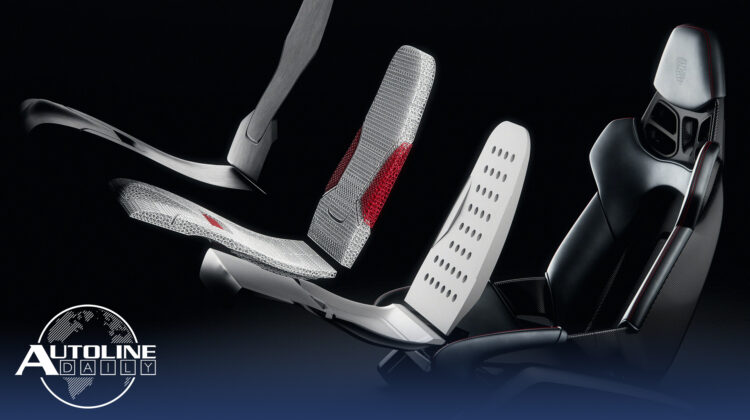
Listen to “AD #2796 – Plants Still Running to Avoid Disaster; Porsche 3D Prints Seat Foam; Hyundai Reveals New Elantra Hybrid” on Spreaker.
Follow us on social media:
Runtime: 9:31
* We’re going to be doing this show a little bit different going forward. The Autoline crew is working from home now, except for me. Not only am I the only one in the studio, I’m the only one in the building. I’m going to be using a printout of the show notes instead of a teleprompter, so cut us a little slack if it doesn’t come off quite as slick as before. *
0:34 OEMs Keep Plants Running to Avoid Disaster
1:35 BYD Starts Making Masks & Disinfectant
2:08 Could China Export More Cars?
3:20 Porsche 3D Prints Seat Foam
4:12 Toyota Taps Into Car Sensors to Make HD Maps
5:07 More New Kia Sorento Details
5:58 Ford-Based Volkswagen Amarok Design Sketch
6:33 Hyundai’s New Elantra & Elantra Hybrid
7:46 ZF Puts Parking Brakes on Front Brakes
Visit our sponsor to thank them for their support of Autoline Daily: Bridgestone.
This is Autoline Daily, the show dedicated to enthusiasts of the global automotive industry.
We’re going to be doing this show a little bit different going forward. The Autoline crew is working from home now, except for me. Not only am I the only one in the studio, I’m the only one in the building. I’m going to be using a printout of the show notes instead of a teleprompter, so cut us a little slack if it doesn’t come off quite as slick as before.
OEMs KEEP PLANTS RUNNING TO AVOID DISASTER
And of course, we’re doing things differently because of the coronavirus, which is really starting to have an impact on the auto industry. All across Europe, automakers and suppliers are shutting down plants. In the U.S. automakers are keeping their plants open, but are using rotating shutdowns to thoroughly clean facilities and equipment. They’re extending the time between shifts so that fewer people are in contact with each other, and they will rotate shifts to minimize risks. You’d think that automakers would simply want to stop making cars since sales are undoubtedly going to take a nosedive. But they’re trying to avoid a financial disaster by keeping operations running as long as they can. And even though retail sales will likely drop, fleet sales will probably not take as quick of a hit.
BYD NOW MAKES MASKS & DISINFECTANT TOO
To help combat the coronavirus outbreak back in February, Chinese automaker BYD began producing face masks and bottles of disinfectant at one of its plants. The company says it’s now the largest mass-produced mask plant in the world. It’s running at full capacity and is able to produce 5 million masks and 300,000 bottles of disinfectant a day. What a great thing and maybe it’s something the Detroit automakers should look into.
COULD CHINA EXPORT MORE CARS?
Will the coronavirus force automakers in China to start exporting cars all over the world? China already had a lot of overcapacity before the coronavirus hit, and now it’s only getting worse. LMC Automotive points out that Kia has 730,000 vehicles of overcapacity and it boosted exports from China by 50,000 units last year. LMC says in 2016 non-Chinese automakers accounted for 19% of exports, that grew to 30% in 2018, and 38% last year. By 2025 it expects China to be a major export hub, but that could put pressure on other countries to put up trade barriers.
PORSCHE 3D PRINTS SEAT FOAM
Porsche developed a unique application for 3D printing. The center section of its full bucket seat has been made to accept a 3D printed polyurethane-based material. It’s also bonded to a base support pad and covered in an outer skin. Part of the printed material is exposed to add a design element and Porsche says the seat also offers lower weight, improved comfort and better ventilation. 40 prototypes will be made available to 911, Cayman and Boxster customers this May to test out on race tracks and provide feedback for a street-legal version. That seat will come in three firmness levels and colors and will be available in the middle of next year.
TOYOTA TAPS INTO CAR SENSORS TO MAKE HD MAPS
Automated vehicles will need high definition maps to operate properly and Toyota is working to make the process of generating those maps even easier. It’s using the data from sensors and cameras already equipped on vehicles today to make up-to-date and high-def maps. For example, this process allows any changes in roadways to be picked up quickly, changed in the maps and sent out to other vehicles. Not only can updates come out faster but Toyota says automakers don’t have to rely on current methods of looking through road construction notices, or using expensive survey vehicles to drive on every road they can.
MORE NEW KIA SORENTO DETAILS
More details are coming out on the new Kia Sorento. It’s built on an all-new platform, which is 35 mm longer than before. The body is also larger and taller, resulting in more passenger and cargo space. Extra ground clearance, when paired with Terrain Mode, improves traction on mud, snow and sand to make this the most capable Sorento ever. The interior is highlighted by dual digital displays. The driver gets a 12.3 inch cluster while the infotainment screen is ten and a quarter inches. A first for the Sorento is optional 20 inch wheels as is a plug-in hybrid powertrain, but there’s no details on it. We’ll get that soon as sales start in the third quarter.
FORD-BASED VOLKSWAGEN AMAROK DESIGN SKETCH
One of the things that will come out of Volkswagen’s partnership with Ford is a new Amarok pickup based on a Ford platform, rumored to be off the Ranger. Well here’s a design sketch from VW of what that truck could look like. There’s no details, so we’d like to know what you think.
HYUNDAI’S NEW ELANTRA & HYBRID
Hyundai introduced the new Elantra and Elantra Hybrid. Built on a new platform, it now features a longer wheelbase, wider stance and lower roofline. It’s the second vehicle in Hyundai’s lineup with its Sensuous Sport design philosophy, which debuted on the new Sonata. The interior features an airplane cockpit layout for the driver and it now comes with a 10.25-inch display cluster and a 10.25-inch infotainment system. For the first time, the Elantra is offered with a hybrid, which consists of a 1.6L four-cylinder, a 32-kW electric motor, a lithium-ion battery and a six-speed DCT. The setup is estimated to deliver more than 50 MPGs. Powering the non-hybrid is a 2.0L four-cylinder mated to Hyundai’s intelligent variable transmission, which is similar to a CVT. Production of the new Elantra kicks off at Hyundai’s plants in Korea and Alabama this fall and sales begin in the fourth quarter.
ZF PUTS PARKING BRAKE ON FRONT BRAKES
Electric parking brakes are increasingly common but mostly on medium and large vehicles. So now ZF is bringing out an electronic parking brake for small, front wheel drive cars. And instead of activating the rear brakes, it works on the front brakes. These electronic parking brakes get rid of the need for a handbrake handle and cable, which frees up more interior space around the center console and gives designers more freedom. ZF already started production in Korea and China and will start selling it in other markets. ZF first launched the technology on the rear axle in 2001 and its been equipped in 75 million vehicles around the globe.
Don’t forget to tune in to Autoline After Hours tomorrow. We’ve got a guy named Jeff Trumble coming on, and he’s come up with a way to immediately track quality problems in a manufacturing plant. What makes his technology so unique is that it pings line workers at their stations and tells them exactly what changes to make to which machines so the line never goes down and only produces perfect quality. That’s going to be a fascinating show. So join me and Gary Vasilash for some of the best insights into the automotive industry.
And that brings us to the end of today’s show, thanks for making Autoline Daily a part of your day.
Thanks to our partner for embedding Autoline Daily on its website: WardsAuto.com

John McElroy is an influential thought leader in the automotive industry. He is a journalist, lecturer, commentator and entrepreneur. He created “Autoline Daily,” the first industry webcast of industry news and analysis.






